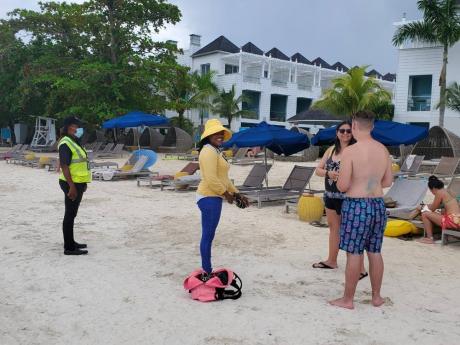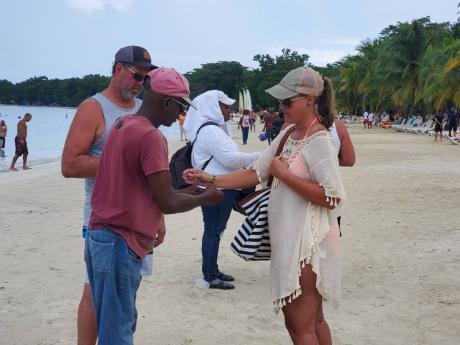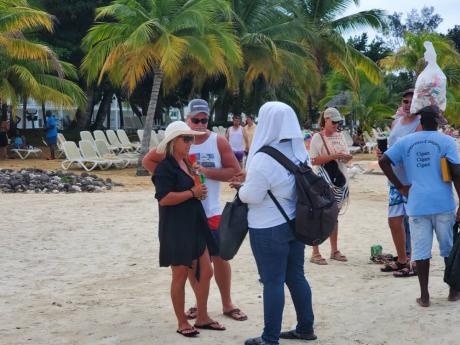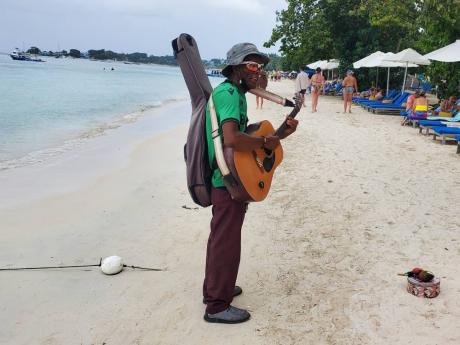Jamaica, no problem?
Harassment, illicit activities continue to plague Negril’s Seven-Mile Beach
Even as properties along Negril’s famed Seven-Mile Beach anticipate healthy visitor arrivals during the summer period, tourist harassment remains a concern despite several mitigation measures over the years to curtail solicitation and illicit activities by locals.
In 2017, some 45 tourism district constables were trained and deployed in the resort town popularly dubbed ‘The Capital of Casual’. It was a result of a joint initiative between the Jamaica Constabulary Force (JCF) and the Tourism Product Development Company (TPDCo), which provided motor vehicles, handcuffs, radios, and other tools for the constables.
But with the western region, which includes the tourism-dependent parishes of St James, Westmoreland and Hanover, featuring prominently on the crime radar in recent years, the police have now concentrated their resources in the crime-prone areas, thus depriving tourist resort areas like Negril of the numbers needed to combat harassment and illicit activities.
“What has worked is that when there is a high proliferation of resort patrol personnel. They are more able to focus in a more precise way on the issues,” Assistant Commissioner of Police (ACP) Clifford Chambers, head of Area One, told The Sunday Gleaner. “It’s a difficult task, and although we have men on the ground, it is not large enough to support a zero-tolerance drive, which is our aim.
“The flip side is that if we have too many uniformed personnel in the area, the guests might start to question if it is because the place is unsafe,” Chambers reasoned. “But we must put an end to this.”
The Westmoreland police say four persons were arrested for harassing tourists, trying to get them to purchase contraband in the past week.
But Ann Chen, managing director of Sandy Haven Resort and the Jamaica Hotel and Tourist Association (JHTA) area chapter chair for Negril, believes that strict enforcement of the law, proper lighting, CCTV as well as additional patrol vehicles will deter acts of harassment.
She also renewed a call for operators along the Seven-Mile Beach to be licensed as the problem of harassment has continued unabated.
Illegal horseback riding is also a challenge, Chen said, especially because there is no facility to hold the animals when they are seized.
“Like our visitors, the locals have a right to use the beach without being harassed,” said Chen in a telephone interview from London. “Negril is not that hard to deal with if you invest and place enough personnel and have the will to effect change.
“On the spectrum of the tourism product in Jamaica, Negril is unique and very marketable, which is why the discerning experienced traveller who wishes to experience the culture and vibe of Jamaica will always choose Negril,” she argued. “Negril’s peculiarity is that it is shared between Westmoreland and Hanover, which requires a level of cooperation between the political representatives, and I believe that that has affected Negril over the years.”
During a trek along the Seven-Mile Beach on Thursday, The Sunday Gleaner team witnessed first-hand several instances of drug peddling and visitor harassment.
Within minutes of arriving at the beach, a female approached a member of the team offering a body massage for US$100. The session would last for one hour and carried out on a makeshift bed behind one of the vendor’s tents near a cluster of all-inclusive hotels. If the price is right, one can enjoy several services, including the special ‘twinkle toe’.
Private security personnel employed to the hotels stood between guests relaxing along the beach by the properties and several vendors competing to sell bracelets and other items. A friendship bracelet costs US$5, while some offered hair braiding for US$20.
At a hotel facility next to a rundown property, a hustler began playing his guitar and singing to a group of visitors relaxing on beach chairs. None acknowledged his presence, but he continued unperturbed.
“I have what you want,” he said, turning to this reporter. “I have the good marijuana … only $7 (US) for two rolls.”
“You don’t have to be afraid,” he said reassuringly, pulling a Marlboro cigarette box from his guitar case. “This is Jamaica, no problem.” The box contained several rolls of ganja joints.
ARCHAIC AND INADEQUATE LAWS
Richard Wallace, president of the Negril Chamber of Commerce and Industry, and managing director of the Boardwalk Village Hotel, said the current laws are archaic and inadequate.
“There are some Jamaicans who are trying to make an honest living out of tourism on the beach, but there are others who are operating in a way that not only put the tourists at risk but also themselves,” Wallace told The Sunday Gleaner.
“These are the people we want to get in line,” he added, voicing his support for the call for the licensing of the small operators. “Right now, the law and the fines on the books to protect tourism are no deterrent in Jamaica.
“As long as the rewards of crime are greater than the consequences of crime, crime will continue to rise, and there is no law on the books that can deal with these issues in this modern day and age to protect the industry.”
“We have one of the top 10 beaches in the world and are treating it just like a man using a Lamborghini to transport marl,” Wallace quipped. “What makes it worse is that it is just a handful of people who are creating the problem.”
According to Section 23A of the Jamaica Tourist Board Act, “no person shall operate or maintain any tourism enterprise unless such person is the holder of a licence”. Section 24 of the act says, “Every person who operates or maintains a tourism enterprise in contravention of Section 23A shall be guilty of an offence and shall be liable on summary conviction before a resident magistrate to a fine not exceeding $20,000 and in default of payment thereof, to imprisonment for a term not exceeding two years.”
One hotelier, who spoke on condition of anonymity, said successive governments have danced around the issue.
“We have to protect tourism. Those who want to make an honest living can be a part of the tourism product, but those creating damage should feel the full force, but if the fines are not a deterrent, all they will do is pay and return to hustle again,” he said.
In 2015, visitor harassment was highlighted as one of the main causes why many cruise ship passengers stay on board while ships are in port on the island. The same is true of stopover visitors, who often do not venture out of hotels out of fear.
Some locals in Negril shared with The Sunday Gleaner, however, that passion is being misinterpreted as antagonism.





